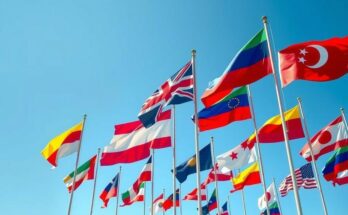Tunisia’s presidential election on October 6 features incumbent Kais Saied, who critics assert has engineered a rigged electoral process. Only two other candidates, Zouhair Magzhaoui and imprisoned Ayachi Zammel, have been approved to run. The election landscape reflects significant limitations on opposition and civil liberties, prompting public protests against perceived authoritarianism. Many citizens, however, express disillusionment with traditional politics, leading to expectations of a decisive victory for Saied.
The upcoming presidential election in Tunisia, scheduled for October 6, features only two challengers to the incumbent President Kais Saied, who faces allegations of manipulating the electoral process to ensure his continued rule. These candidates are left-wing nationalist Zouhair Magzhaoui, perceived as a token opposition figure, and Ayachi Zammel, the imprisoned leader of the Azimoun party, whose recent convictions are regarded as politically motivated. The election landscape has been significantly altered by a series of reforms initiated by President Saied since a power grab in July 2021, which have seemingly curtailed democratic processes and led to the disqualification of numerous candidates. The Independent High Authority for Elections (ISIE) has approved only three candidates for the ballot, disregarding the rulings of the Administrative Court that sought to reinstate additional opposition figures. This perceived bias has incited public protests advocating for free elections and greater civil liberties, although many citizens remain apathetic toward electoral politics, disillusioned by past experiences with political leaders. Kais Saied governs with substantial support from segments of the public dissatisfied with traditional political figures. The anticipated outcome of the election is likely to be a resounding victory for Saied, further consolidating his control over Tunisian politics.
The political climate in Tunisia is fraught with tensions as the country prepares for a presidential election that many believe favors the incumbent, Kais Saied. Since his rise to power, Saied has enacted sweeping reforms that critics claim undermine the democratic institutions established post-Arab Spring. The Independent High Authority for Elections (ISIE), ostensibly an impartial body, has been accused of acting as an extension of the presidency, eliminating credible opposition candidates ahead of the vote. This situation has generated significant unrest among opposition groups, leading to public demonstrations demanding a return to democratic principles. Saied’s presidency has been characterized by a crackdown on dissent, indicated by the imprisonment of various political figures and the imposition of laws curtailing free speech.
The upcoming presidential election in Tunisia, marred by accusations of authoritarian tactics and the suppression of legitimate opposition, presents a critical juncture for the nation’s democracy. With the disqualification of numerous candidates and the imprisonment of Ayachi Zammel, the election ostensibly consolidates Kais Saied’s grip on power, raising alarms about the future of civil liberties and democratic governance in Tunisia. This election is not only a test of Saied’s popularity but also an indicator of the populace’s resilience against authoritarianism and its quest for genuine democratic representation.
Original Source: www.aljazeera.com




